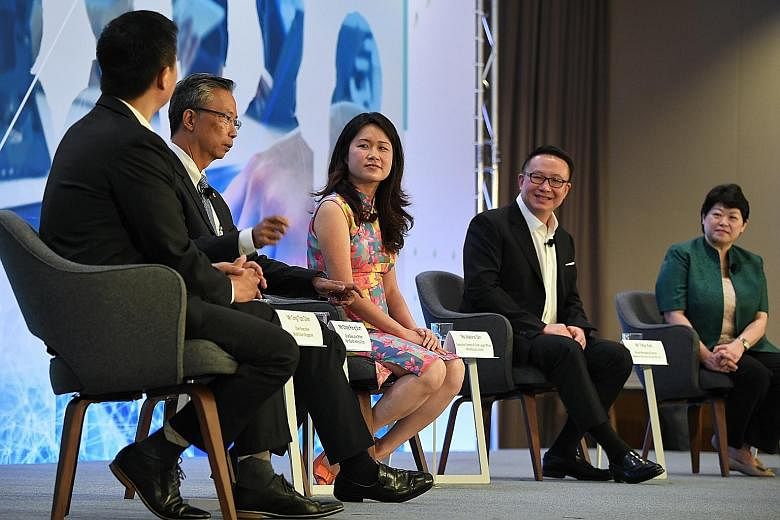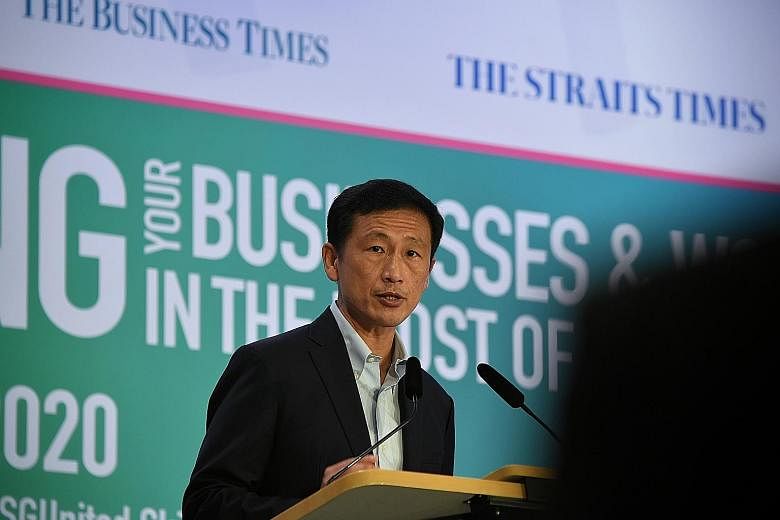A shift in mindset is necessary for businesses to transform digitally in order to survive the ongoing Covid-19 pandemic.
And this change must come from both employers and employees - the willingness of firms to embrace technology and employees being open to upskilling and adapting to changes.
In fact, "attitudinal" training - the building up of a good mindset towards embracing change - is just as important as skills training, industry leaders said at a forum organised by SkillsFuture Singapore (SSG) last Friday.
The topic of how businesses and the workforce can be reshaped to mitigate the fallout from the pandemic was discussed at the forum.
Supported by The Business Times and The Straits Times, the forum is part of this year's SkillsFuture Month organised by SSG and various partners.
More than 80 community, education and industry partners are taking part in the SkillsFuture Month, which runs till Aug 16 and is expected to reach out to more than 15,000 learners.
Mr Choe Peng Sum, chief executive of Pan Pacific Hotels Group, said the important thing about skills training is that "we make sure that it also includes mindset change".
Using a hotel as an example, he said it could involve teaching employees to have a business mindset.
"When (a hotel's) occupancy is down, many housekeepers say, 'Oh good, no work!'. But if they know the business and we explain the business to them, they say, 'Oh dear, how are we going to find the money?'" he said.
When employees feel that they do play a part in the business, they get excited about it and want to do more, Mr Choe added.
"So I really strongly believe in communication and attitudinal training."

Other panellists at the forum were Mr Ong Tze-Ch'in, CEO of SSG; Ms Adeline Sim, executive director and chief legal officer of HRnetGroup; Mr Toby Koh, group managing director of Ademco Security Group; and Ms Susan Chong, CEO of packaging company Greenpac.
The discussion was moderated by The Business Times' digital editor Christopher Lim.
Education Minister Ong Ye Kung delivered a speech before the forum.
SSG's Mr Ong said that at the heart of the SkillsFuture national movement, which promotes lifelong learning, "what we really want is for every Singaporean to embrace that growth mindset... soaking up new opportunities, new skills and be excited to learn new things".
Ademco Security Group's Mr Koh suggested that one way to do this could be by helping employees see how exactly they can value-add to the company by upskilling and taking on bigger roles that machines will not be able to fulfil.
For example, security officers are able to investigate and interact with the public, as well as assess risks, whereas "technology has its limitations", Mr Koh said.
The way forward is for employees to keep improving on their skills and knowledge, and learn to use technology to their advantage.
In his industry, when that happens, the remuneration could then rise to a level that is attractive enough for professionals, managers, executives and technicians (PMETs) to consider working as security officers, said Mr Koh.
"They would no longer be just patrolling around the place, instead, they are adding value to the industry," he added.
Mr Koh noted that, generally, many business owners tend to look for people within the industry when making a new hire, but there is also value in opening up to people with diverse backgrounds.
"You get fresh ideas and a new way of looking at things... sometimes, getting a fresh perspective is extremely important for (the business) to move ahead," he said.
SSG's Mr Ong said that while upskilling workers is not a new concept - the SkillsFuture movement was launched in 2015 - the unprecedented Covid-19 crisis has made the need for retraining and mindset change more urgent.
"The scale of it is unprecedented because of the amount of transformation and change that's happening in the industry and workplace. We need to support that and equip our individuals and workers with skills for the new future," he said.
In his May Day speech this year, Prime Minister Lee Hsien Loong had said that, because of the pandemic, some industries in Singapore will be disrupted permanently and some jobs will simply disappear.
Companies will have to change their business models to survive, and workers whose jobs no longer exist will have to re-skill and move to new sectors.
Mr Ong noted that SSG is hoping to generate more than 20,000 opportunities through the SGUnited Skills programme, a full-time training initiative targeting those looking to upgrade their skills while job hunting.
The programme also serves as a business networking platform for trainees, said Greenpac's Ms Chong.
"(While in the programme,) they get to know the businesses more," she said, adding that this could make it easier for them to plan their new career.



